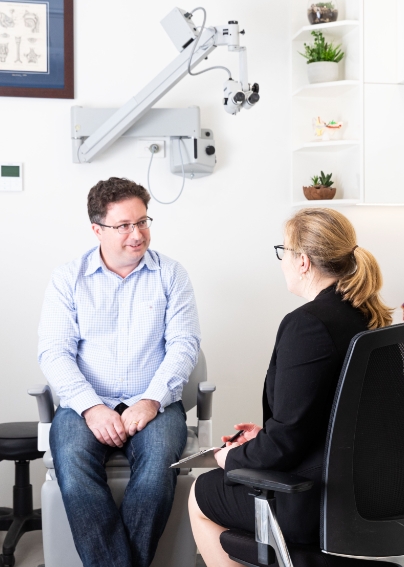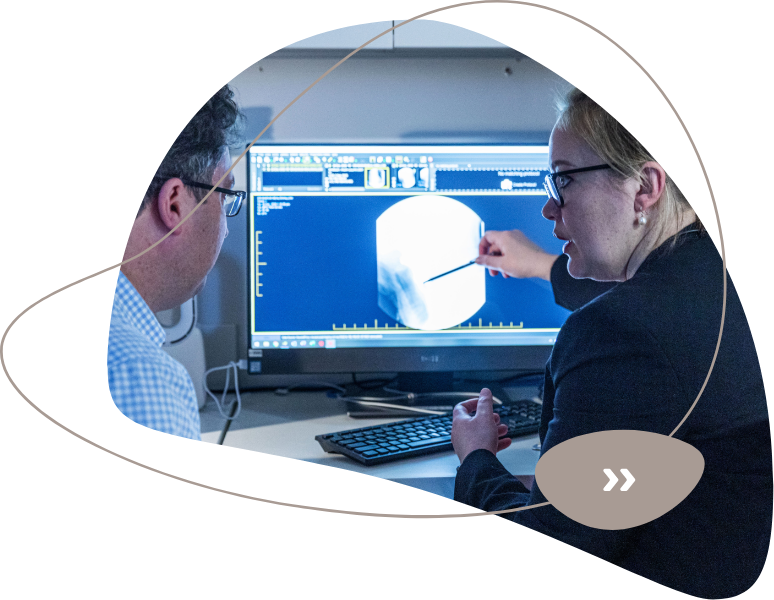Snoring
Most people snore now and then, but for some people, snoring is an ongoing problem. Snoring can sometimes be a sign of obstructive sleep apnoea, a potentially serious condition that requires medical attention.
What causes snoring?
Snoring happens when there is a narrowing or collapse in the soft tissues of your throat and upper airway. While you are asleep, the soft tissue surrounding your upper airway relaxes. This can result in narrowing of the breathing passage, so that inhaling causes vibration of the surrounding tissues. This vibration produces the sound that we know as snoring.
Factors that could increase your snoring risk include:

- Obesity
Being overweight leads to increased soft tissue in the neck, which can put pressure on the airway.
- Head and neck anatomy
Anatomical features like a small jaw, a large tongue or large tonsils increase snoring risk.
- Nasal congestion
Nasal allergies and infections are the most common causes of nasal congestion. A deviated nasal septum or nasal polyps could cause further airflow restriction.
- Alcohol and sedatives
Alcohol and sedative medications relax the muscles that help to keep your airway open.
- Ageing
Ageing is associated with weakening of the muscles that support the airway and the tongue.
- Smoking
Smoking increases your risk for snoring. This may be due to soft tissue swelling caused by ongoing airway irritation.
- Hypothyroidism
An underactive thyroid can cause changes in the tissues of the face and neck that contribute to snoring.
How can I improve my snoring?
There are several lifestyle changes that can help to reduce snoring:
- Lose weight
If you are overweight, weight loss may improve or even eliminate your snoring.
- Avoid alcohol before bedtime
Try to avoid drinking alcohol or sedatives for at least 2 hours before bedtime.
- Treat nasal symptoms
It is important to treat the underlying cause of nasal symptoms, whether this is related to nasal allergies or structural problems in the nose. Dr Crawford will advise you regarding the optimal treatment of your nasal symptoms.
- Stop smoking
Stopping smoking will have enormous benefits for your health, and is likely to reduce your snoring.
- Changing your sleeping position
Sleeping on your back may worsen snoring. The optimal position for maintaining an open airway during sleep is on your side. It may also help to elevate the head of your bed or use an extra pillow.
When should I see my doctor for snoring?
Regular snoring may be a sign of obstructive sleep apnoea, a condition which requires specialised treatment. Appropriate treatment of obstructive sleep apnoea helps to optimise your wellbeing and prevent serious health complications.
It would be wise to consult your doctor for your snoring, if you (or your partner) have noticed any of the following symptoms:
- Pauses in breathing during sleep, especially if followed by gasping.
- Excessive sleepiness during the day.
- Morning headaches.
- Not feeling rested when waking up in the morning.
- Waking up at night feeling confused.
- Difficulties with concentration or memory.
- Recent weight gain.

If your doctor suspects obstructive sleep apnoea, you may be referred for sleep studies and management by a specialist with expertise in this field. Dr Julia Crawford specialises in the management of this important but under-diagnosed condition, and will be able to determine the best treatment option for you. When you have your GP referral, please call our team to arrange for a consultation with Dr Crawford at our Darlinghurst or Kogarah rooms.


